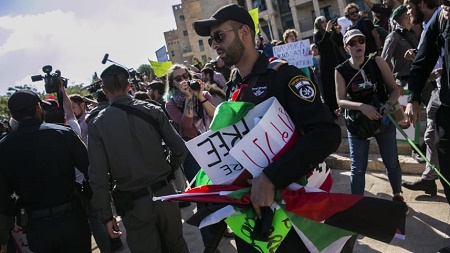CSM Defending the Defenders at CFS 45

Recognizing the increasing hostility toward economic, social, and cultural rights defenders, the Civil Society Mechanism (CSM) for relations with the UN Committee on World Food Security (CFS) organized a side event on human rights defenders at the October 2018 CFS45 at Rome. The event, Defend the Defenders: How to effectively protect those who fight for the right to food, highlighted the threats and criminalization faced by indigenous peoples and social movements in their struggles for their rights to foods, lands, fisheries and forests.
Participants identified a number of tools used to intimidate, criminalize, and destroy the framework around human rights defenders, including stigmatization (including women’s reputations), threats, criminalization, torture, disappearance, sexual violence, attacks against family members, restriction of movement, limitation of economic resources, and use of instigating or discriminatory language by politicians to encourage their followers to use physical aggression against defenders. In combatting this disturbing trend, speakers highlighted the role that regional and international human rights mechanisms can play, as well as the need for a stronger commitment by duty holders, and for the promotion of the use and implementation of existing human rights mechanisms.
Speakers shared cases on Palestine, Cameroon, South East Asia and Kenya, and Nadia Aï Zaï of the African Human and Peoples Rights Commission (ACHPR) explained the ways that human rights defenders can be defended, including through the use of human rights mechanisms.
According to the speaker on Palestine, reports from numerous sources have noted with concern that human rights defenders in Palestine face increasing attacks, arrest, detention and threats. The criminalization of defending human rights has been enshrined in discriminatory Israeli laws specifically designed to restrict and repress the Palestinian people, whereas the system of arrest and detention is an integral part of the Israeli colonial apparatus.
As of September 2018, Israel is holding 5,640 political prisoners, including 465 held in administrative detention (incarceration without trial or charge) and 270 children, including 50 children under the age of 16. Human rights defenders in the West Bank are often prosecuted under Military Order 101, which criminalizes organizing and participating in political protests or vigils, printing or publicizing political material and the bearing of national symbols such as flags.
Recently, a number of new laws criminalizing the actions of those who aim to draw attention to Israel’s human rights abuses have been passed, including:
-
2016 NGO Transparency Law: forces human rights groups that receive more than half their funding from abroad, including from European governments, to disclose their funding sources on all publications and communications with government. This law targets left-wing groups which support human rights, while excluding right-wing, nationalist, and pro-occupation groups, which are not required to reveal their funding sources.
-
2017 Anti-Boycott Divestment and Sanctions (BDS) Entry Law: bars international supporters of BDS from entering the occupied Palestinian territories via their Israeli controlled borders; this includes many people of Palestinian descent who are now unable to visit their families in the occupied territories. BDS is one of the fastest growing and most effective popular movements challenging Israel’s suppression of Palestinian human rights.
-
In June 2018, a bill criminalizing the filming of Israeli soldiers passed its first reading in the Israeli parliament. That bill would subject anyone caught filming or publishing footage of military activities with the purpose of harming the soldiers’ morale to as much as five years behind bars. The bill was proposed two days after a video showing Israeli soldiers cheering as a sniper shot a motionless Palestinian man in Gaza went viral.
Escalating instances of intimidation and reprisals against human rights defenders who cooperate with the UN Human Rights system, including UN Special Rapporteurs, prompted UN Special Procedures in June 2015 to consolidate and enhance their response to these unacceptable practices. In doing so, they reaffirmed Human Rights Council (HRC) resolutions 12/2, 24/24 and 36/21 and established a framework for action for mandate holders when faced with such cases. On 30 July 2015 the Human Rights Treaties Bodies adopted the San José Guidelines against Intimidation or Reprisals.
|